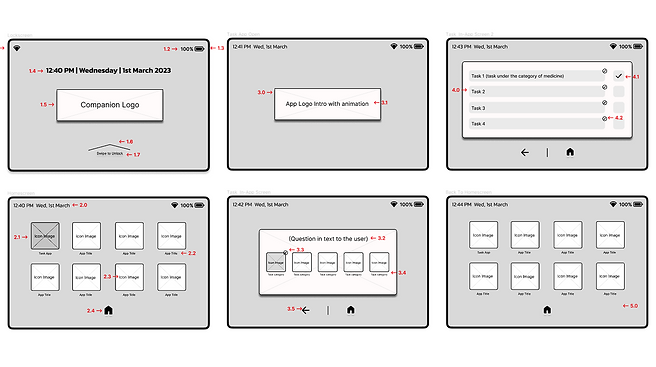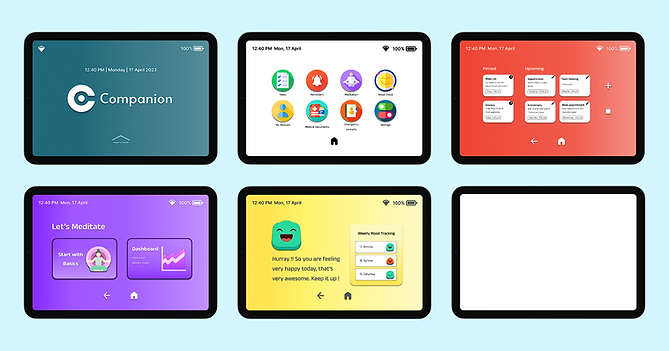Companion
Recovery with Ease
UX DESIGN / UI DESIGN / USER RESEARCH


Role
Sole UI/UX Designer
Duration
4 - 5 months
Tools
Miro, Google Forms, Figma, MS Excel, Canva, Google Docs & Sheets
Overview
This project is self-driven but based on the Senior Project course in my second semester in my Interactive Media Management Program at Centennial College - Story Arts Center
Context
Injured individuals struggle to maintain routines due to physical and mental stress, affecting appetite and medication adherence. Resting, emotional stress, and drowsiness from pain medication disrupt schedule and recall. The "Companion" product aims to support injured individuals in managing tasks, nutrition and medication effectively.

Problem Statement
How might we come up with a solution that will help injured individuals especially who have severe injuries, to track and and do the necessary chores and activities at their particular time according to their health condition while they are recovering from their illness, so their health may not get in any kind of harm or danger and they recover with comfortability & ease.
The Solution
A modern designed tablet-like product, which will assist users who are injured and who are recovering from their injury, it will help them in tracking and performing the essential small tasks and activities at the appropriate timed routine based on their health condition.
It will help users get scheduled reminders of the different essential tasks they need to do such as scheduled medicine, little exercise, meditation etc.
Concept Validation
& User Research
I carried out a concept validation survey to better understand the needs, objectives, and marketability of the demographic I am targeting. I then used an excel sheet to group the responses from my users and analyze them to draw general conclusions.
The user research also including comparative analysis essentially held me many information to further aid in user persona, journey map, etc. and helped me confirm or revise my potential solutions and user narratives.
Persona

I produced a user journey map in addition to the persona to help me better grasp the procedures and actions involved in my ideation.
Journey Map

To organize the layout of Companion tablet's apps and have a visual representation of the screens and their relationships, I next constructed a site map.
Sitemap

Final Reflection
Working on the "Companion" project as the sole UI/UX designer was a transformative experience. I tackled the challenge of helping injured individuals with severe injuries during their recovery, which allowed me to enhance my skills in user-centered design, empathy, and problem-solving. Collaborating with various tools such as Miro, Google Forms, Figma, and more, I improved my technical proficiency and learned to work effectively in a multidisciplinary team environment.
Conducting comprehensive user research, including concept validation surveys and comparative analysis, helped me understand the target demographic's needs and refine the design direction. Developing user personas, journey maps, sitemaps, wireframes, and prototypes facilitated iterative design improvements. Incorporating user feedback and insights further emphasized the importance of the iterative design process and creating impactful solutions.
The final solution, "Companion," is a modern tablet-like device that provides scheduled reminders for essential tasks, medication, exercises, and meditation during the recovery process. It ensures users can recover comfortably and safely. This project reinforced the significance of user-centered design principles and the effectiveness of iterative design approaches and enhanced my design thinking skills. Overall, it expanded my professional capabilities and fueled my passion for designing solutions that positively impact people's lives.

.png)
.png)
.png)